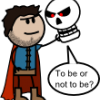Background: I'm developing a Tactical RPG. I am a programmer first and foremost, I'd like to think that I can do a decent design (but since I'm just cloning a game I already know has terrific gameplay [Final Fantasy Tactics], level design and campaign flow are probably the biggest things I have to worry about).
I was planning the story for a game I'm trying to develop, and I suddenly realized that it was becoming monstrously bloated.
How do you deal with keeping the plot focused, and within the confines of what will amount to only a few dozen pages of character dialogue and script interludes over the course of the game? How can I do this without scuttling world-building and serious character development?
🎉 Celebrating 25 Years of GameDev.net! 🎉
Not many can claim 25 years on the Internet! Join us in celebrating this milestone. Learn more about our history, and thank you for being a part of our community!
Focusing the Plot
Carefully delete what isn't necessary.
To do this you need to understand what's necessary.
If you're a non-writer, you might go minimal; write what's necessary to communicate the game rules and move the player along.
I say this because bad writing is not better than less writing. Having little or no story is OK; it's a game, not a book. But adding a large amount of bad fluff because you think you're supposed to can hurt the product.
Try to make sure everything characterizes everything. You can pack a lot of information and details and richness in. I'm talking about art, attacks, weapons, etc. It's not about making up piles of stuff, but about making everything tell a story without actually bothering to dump a lot of prose & cut-scenes on the player.
Now then, let's say you really want to be a bit more ambitious.
In that case you need a broader concept of what is "necessary" so that you know not to cut it.
It sounds like you've written a lot, right? Good job. Now carefully read and understand what you've written; dig for themes, understand what the plot is, what are the feelings and what did the whole thing wind up saying? Find the hidden meaning you might not have realized you wrote. Don't be surprised if it correlates with something on your mind a lot or how you think in some fundamental way.
Once you understand that, go through to build your 2nd draft. Your 2nd draft will cut a lot. It's supposed to.
Of course, feel free to post what you have and we can take a more informed look at where you are, what you have, what you can do, etc.
To do this you need to understand what's necessary.
If you're a non-writer, you might go minimal; write what's necessary to communicate the game rules and move the player along.
I say this because bad writing is not better than less writing. Having little or no story is OK; it's a game, not a book. But adding a large amount of bad fluff because you think you're supposed to can hurt the product.
Quote: within the confines of what will amount to only a few dozen pages of character dialogue and script interludes over the course of the game? How can I do this without scuttling world-building and serious character development?
Try to make sure everything characterizes everything. You can pack a lot of information and details and richness in. I'm talking about art, attacks, weapons, etc. It's not about making up piles of stuff, but about making everything tell a story without actually bothering to dump a lot of prose & cut-scenes on the player.
Now then, let's say you really want to be a bit more ambitious.
In that case you need a broader concept of what is "necessary" so that you know not to cut it.
It sounds like you've written a lot, right? Good job. Now carefully read and understand what you've written; dig for themes, understand what the plot is, what are the feelings and what did the whole thing wind up saying? Find the hidden meaning you might not have realized you wrote. Don't be surprised if it correlates with something on your mind a lot or how you think in some fundamental way.
Once you understand that, go through to build your 2nd draft. Your 2nd draft will cut a lot. It's supposed to.
Of course, feel free to post what you have and we can take a more informed look at where you are, what you have, what you can do, etc.
I strongly agree with JoeCooper.
I can try to add some procedure I use.
1) Cut the unnecessary. If the story can go on without an element, you can cut it.
2) Cut the less entertaining. Let's say you've 10 events. Make a ranking, and start to cut the worst ones.
3) Melt the elements. Let's say you've two secondary character you need to introduce and you can't delete. You can melt them. Melting is a big issue since it make the elements better and reduce the space needed to introduce them. Let's say you need a detective and an hacker. You can make and hacker detective.
Or maybe you need an hacker, a detective and a lover for the brother of the main character. You can add it. A hacker-detective-lover of the brother of the main character. Continue to melt until you can, it's always better to have one deep element than to have three plain ones.
You can also use the same for setting, object (such use a room for armery and as an hospital at the same time).
4) Use scenes that explain more thing, but, in this case, be care to not confuse the audience with too many inputs at the same time.
Pass through the point 1 to 4 until you feel the story is ok.
Don't be afraid to cut.
I can try to add some procedure I use.
1) Cut the unnecessary. If the story can go on without an element, you can cut it.
2) Cut the less entertaining. Let's say you've 10 events. Make a ranking, and start to cut the worst ones.
3) Melt the elements. Let's say you've two secondary character you need to introduce and you can't delete. You can melt them. Melting is a big issue since it make the elements better and reduce the space needed to introduce them. Let's say you need a detective and an hacker. You can make and hacker detective.
Or maybe you need an hacker, a detective and a lover for the brother of the main character. You can add it. A hacker-detective-lover of the brother of the main character. Continue to melt until you can, it's always better to have one deep element than to have three plain ones.
You can also use the same for setting, object (such use a room for armery and as an hospital at the same time).
4) Use scenes that explain more thing, but, in this case, be care to not confuse the audience with too many inputs at the same time.
Pass through the point 1 to 4 until you feel the story is ok.
Don't be afraid to cut.
Build backward from the climactic battle and be aware of your theme(s). If a piece of story doesn't move the plot from the initial incident toward the climax and also isn't important to the theme, it doesn't have a good reason to be in the game. Making an outline is often helpful.
This topic is closed to new replies.
Advertisement
Popular Topics
Advertisement






